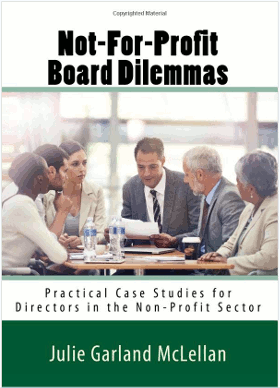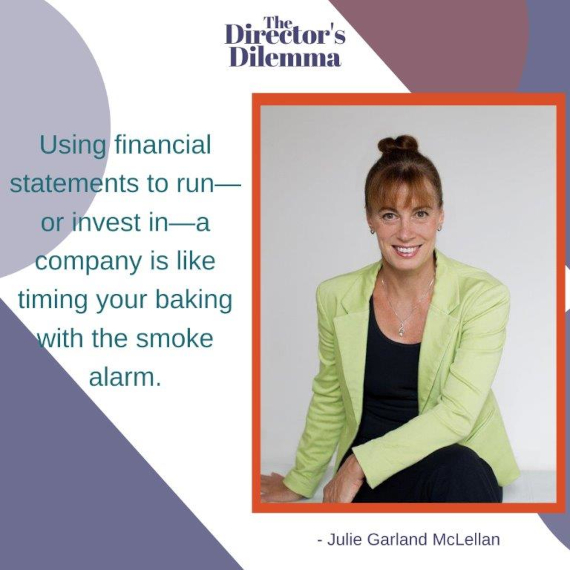|
|
|
|
|
|
|
|
|
Dear reader,
Welcome to the October 2021 edition of The Director’s Dilemma. Each month this newsletter looks at a real-life scenario that happened to a board, perhaps to a board like yours, and considers a range of responses. The scenarios are de-identified to protect the individuals concerned. This month we consider the implications of a board that is representative of shareholder interests rather than skills based when a company needs additional capital.
Of course, these scenarios are general, written to help you with practical information without the risks that attach to living these situations in real-life. I work with boards and directors as a confidential mentor to help them build great companies and maximise their impact. If you would like personalised service, please call me.
To read this email in a web browser, go to www.mclellan.com.au/newsletter.html and click on 'read the latest issue'. I hope you will enjoy the latest dilemma:
 Lloyd is a director of an incorporated joint venture (JV) where all directors are nominees of the shareholders. The market for the company's product is growing strongly. Profits are slightly above the original forecasts but can't grow any higher due to capacity constraints. Lloyd is a director of an incorporated joint venture (JV) where all directors are nominees of the shareholders. The market for the company's product is growing strongly. Profits are slightly above the original forecasts but can't grow any higher due to capacity constraints.
The company constitution is very much a 'plain vanilla' document and directors are more likely to refer to the shareholders agreement to resolve issues that arise. The board is fortunate that the directors are experienced in the company's operations, honest, and willing to make an effort to achieve good governance.
The JV is looking to expand operations and increase its capital to make the required investments. This is causing differences among the directors, as some work for shareholders who are willing and able to invest more equity, others work for shareholders who are willing to increase debt but not to put in more capital, and one shareholder who doesn't want to expand this venture because that company no longer embraces projects of this nature.
The Board Chair has gone overseas to a new position and the role, previously held by the largest shareholder's nominee, is now vacant. Lloyd's employer has asked him to take on the role and lobby for the interests of the shareholders who want to expand. The largest shareholder has yet to announce a replacement for the former chair and, under the Shareholders Agreement, the board should select its own chair from among the directors.
Lloyd is unsure whether he should ask his colleagues to appoint him or whether that might trigger an increase in the tensions that have arisen between directors. How would you advise him to proceed?
|
|
|
|
Stephen's Answer
 Lloyd should first study the Shareholders agreement, particularly the "pre-emptive rights" clauses, which ensures current shareholders are able to purchase a Shareholder's interest before this is offered in the open market. Additionally, he should understand the "share valuation" mechanism for any Shareholder who wishes to sell their shares, and know whether there are any "special resolution" clauses for important Shareholder issues that might prescribe a vote of 51% or 60% of the Shareholders should they wish to exit a Shareholder. Lloyd should first study the Shareholders agreement, particularly the "pre-emptive rights" clauses, which ensures current shareholders are able to purchase a Shareholder's interest before this is offered in the open market. Additionally, he should understand the "share valuation" mechanism for any Shareholder who wishes to sell their shares, and know whether there are any "special resolution" clauses for important Shareholder issues that might prescribe a vote of 51% or 60% of the Shareholders should they wish to exit a Shareholder.
With this information Lloyd should approach the largest Shareholder first, whose nominee was Chairman, and point out that the Shareholders agreement clearly states that the next Chair must come from the current directors and offer his services as Chairman, as this is a strategically viable choice. He should then suggest that his plan would be to expand the business with a blend of debt and equity – for example 30% to 70% - taking into account all remaining Shareholders' wishes.
Armed with a positive response from the major Shareholder, he should approach each Shareholder separately and share his plan. The Shareholder who no longer embraces the project should be approached last and their exit agreed in line with the terms of the Shareholders agreement they signed.
Once this is done, Lloyd should:
-
convene a board meeting of all Shareholders,
-
have his election as Chairman ratified,
-
agree on the terms and conditions of the sale of the Shareholders interest who no longer embraces the project, and
-
agree on the funding of the expansion, with the appropriate balance between equity and debt, so all remaining Shareholders' interests are catered for.
This would allow the business to expand its capacity with the right balance of equity and debt and enable the company to continue growing its profits.
Stephen Dallamore was Global Chairman of AltoPartners from 2015 - 2020. Stephen is a Director at Search Partners International / AltoPartners South Africa. He is based in Johannesburg, South Africa.
|
|
|
|
Julie's Answer

The governance of joint ventures is hard. Shareholders are often constrained within an agreement that was fine at the outset but that lacks liquidity and easy exit/renewal of shareholders to allow changes in growth, profitability, capital requirements, or strategy.
Lloyd needs to read his constitution carefully - what constraints does it place on the duties of directors to act in the interests of the organisation rather than any stakeholder or group of stakeholders? What are the precise mechanisms for chair succession? Do the shareholders need to vote on expansion and additional investment, or can the board decide and simply seek investment support from the shareholders who can provide it?
Then he needs to consider the expectations of his board. If the largest shareholder's nominee was the former chair, what does the constitution say about how future chairs will be selected? Is the board waiting to see if the shareholder will appoint a director before they make their election (which would be fair, if perhaps a little slow) or are they expecting to accept that shareholder's nominee as their chair?
When he understands the 'in-company' issues, Lloyd needs to understand the shareholder issues. He needs to listen to each shareholder and demonstrate that he understands and empathises with their feelings.
Then he needs to do his duty and work out what is the right path forward for the company. If taking the chair role seems like the best path for the company and it is within his capability to do it well, then Lloyd should put himself forward as a candidate. If he thinks he lacks the ability to lead at this time he should hold back and support another chair candidate.
Then, when the board has reached a decision about what to do, Lloyd can add further value by helping them to explain to shareholders, succinctly yet transparently, with empathy but no apology or defensiveness, what is in the best interests of the company. That explanation must be forthcoming even if the shareholders have no power to veto the decision.
Julie Garland McLellan is an experienced non-executive director and board advisor based in Sydney, Australia.
|
|
|
|
Tracey's Answer
 Lloyd's situation is complex, the most pressing issues being the appointment of a replacement Chair, and the composition and decision-making dynamics of the board. Lloyd's situation is complex, the most pressing issues being the appointment of a replacement Chair, and the composition and decision-making dynamics of the board.
Lloyd should carefully consider his reasons for taking on the Chair role, if he does so purely to fulfil the lobbying request from his employer, he would certainly not be acting in the best interests of the JV company. As Chair Lloyd must be able to exercise his fiduciary responsibility and avoid such a conflict of interest.
A Board Chair must be able to exhibit effective leadership, confidence to facilitate robust, and sometimes uncomfortable debate, ensure all views are heard, and guide individuals towards consensus in decision making. In the current situation this is imperative. If Lloyd is concerned that his appointment would trigger further tension, then he would be wise to conduct exploratory discussions with the other directors, he would need to balance this feedback with the pressure from his employer.
The Board's primary responsibility is to the JV company, the directors should act in the best interests of the JV above those of individual shareholders. This can be very difficult when the board comprises shareholder nominee directors only.
As a growing business, the JV should review the role and composition of its board, I would recommend the appointment of an independent Chair with a determining vote. In addition, the JV should look beyond the shareholder agreement and develop a constitution that will support future growth, clarifying the distinction between the role of the board and that of the shareholders, plus establishing strong governance and decision-making frameworks.
Tracy Morgan is a Non-Executive Director and Chair Finance & Audit Committee for Wesley Community Services Ltd, and Managing Director of Morstone Pty Ltd. She is based in Sydney, Australia.
|
|
|
|
Julie’s News
September was an exciting month. I was delighted to host the first ever fireside chat with Mervyn King, Bob Garratt, and Peter Dey! We discussed the reasons for their commitment to governance, the sources of their inspiration, and their hopes for the future. You can watch a recording at https://lnkd.in/gRvCYThJ.
I also had the pleasure of undertaking board reviews for a complex APRA regulated business that needed to comply with SPS510 and for a large NFP that wanted to implement a board development program and was struggling to meet the needs of a very diverse board.
In addition I delivered five new online training modules covering board role and director duties, financial oversight, strategy and risk, succession planning and board composition, and board documentation. If your board would benefit from these short courses let me know. I would be delighted to run them again.
Book Review - Not for Profit Board Dilemmas - practical case studies for directors in the non-profit sector by Julie Garland McLellan
 Why do people join not-for-profit boards? The reasons for supporting any particular cause are many. So are the events that can, will and do happen in the boardroom. Many who choose to join not-for-profit boards are keen to make an impact and support important missions, but they are also unprepared for the need to make sound and timely judgements with very little previous exposure or experience. Why do people join not-for-profit boards? The reasons for supporting any particular cause are many. So are the events that can, will and do happen in the boardroom. Many who choose to join not-for-profit boards are keen to make an impact and support important missions, but they are also unprepared for the need to make sound and timely judgements with very little previous exposure or experience.
Not-For-Profit Board Dilemmas helps bridge this inexperience gap. The twenty case studies are based on real-life events and are designed to provide directors with insights into key legal and practical issues and help them craft a winning strategy for their organisations.
Using a case study approach, Julie Garland McLellan harnesses the contributions of forty board practitioner who share their insights and distil their complex experience into concentrated and accessible solutions.
The ideas voiced by respondents to each dilemma are not the final ruling or definitive correct answer - rather they provoke contemplation and are the basis for further thought:
-
Whom do you agree with most?
-
What other aspects should you consider?
-
Why are some response instinctively rejected?
-
Why are some responses immediately attractive?
-
What would you do under the circumstances?
Available at AICD Bookstore and Amazon.
Inspirational quote for October

Not related to the dilemma this month - still a good quote to remember. Use your knowledge of the company's performance to give you comfort that the financial statements are correct. Don't use the financial statements to give you comfort that the company performance is correct. Remember that they are historical statements not reliable forecasts!
Do you know where to focus your director and board development? – boards often struggle to get cut through and drive company performance. They work hard, then they work harder, then call in a consultant who recommends some changes, then they work harder still.
If that sounds like your board, don't worry. It is likely that you have simply been focusing on the wrong stuff. I have made a diagnostic tool that might help you to prioritise the actions that will free your board from the drudgery and allow you to maximise your impact. You can take the diagnostic here:
https://directorsdilemma.scoreapp.com
Call me afterwards for help with revitalising your board.
A note on names - A few readers have asked me where I find the names for the protagonists in each case study; I 'borrow' them from people I meet or things that I read. Lloyd is of Welsh origin derived from Llwyd, and the meaning of Lloyd is "grey-haired; sacred". The name may originally allude to experience and wisdom, and probably denoted a person entitled to respect. Our protagonist will need to demonstrate wisdom going through the next stage of his board's development and will surely develop some grey hairs as he does.
This newsletter - If you have any ideas for improving the newsletter please let me know. If you are reading a forwarded copy, please visit my website and sign up for your own subscription.
Suggestions for dilemmas - Thank you to all the readers who have suggested dilemmas. They are greatly appreciated. I will answer them all eventually. I could not write this newsletter without your help and without the generous help of all the experts who respond each month to the case studies.
Be a contributor - if you would like to attempt a response to the dilemmas for publication you will be most welcome. Simply reply to this email and let me know. I am always on the look out for new talent from around the world so please reach out if that sounds like something you could do.
Let's connect - I use LinkedIn to share information about boards and directorship with my friends and acquaintances. If you use LinkedIn and we are not yet connected I will welcome a connection from you. You can find me at linkedin.com/in/juliegarlandmclellan.
Let me help you - I would be delighted to speak for or train your board, staff, audience and/or group. If I can help, please contact me at julie@mclellan.com.au.
Farewell until the next issue due 1 November 2021. I look forward to greeting you again then. In the interim I hope you will enjoy health, happiness and hard work.
Enjoy governing your companies!
Best regards,
Julie

Main Photo by fauxels from Pexels
Quote Illustration by Julie Garland McLellan
Disclaimer:
The opinions expressed above are general in nature and are designed to help you to develop your judgement as a director. They are not a definitive legal ruling and do not constitute legal advice. Names and some circumstances in the case study have been changed to ensure anonymity. Contributors to this newsletter comment in the context of their own jurisdiction; readers should check their local laws and regulations as they may be very different.
Privacy: I am privileged to have your contact details and keep them as safely as possible. I will alert you if they are ever accessed by any unauthorised person (the technical staff at ayuda help with publishing and issuing the Director's Dilemma and have access so they can send the newsletters to you). I do not sell your details to anyone; they are kept only for the intended purpose - sending you this newsletter and helping to build the judgement of company directors by providing a safe way to consider potential responses to real life events.
|
|
|
|
|
|
|
 Lloyd is a director of an incorporated joint venture (JV) where all directors are nominees of the shareholders. The market for the company's product is growing strongly. Profits are slightly above the original forecasts but can't grow any higher due to capacity constraints.
Lloyd is a director of an incorporated joint venture (JV) where all directors are nominees of the shareholders. The market for the company's product is growing strongly. Profits are slightly above the original forecasts but can't grow any higher due to capacity constraints.
 Lloyd should first study the Shareholders agreement, particularly the "pre-emptive rights" clauses, which ensures current shareholders are able to purchase a Shareholder's interest before this is offered in the open market. Additionally, he should understand the "share valuation" mechanism for any Shareholder who wishes to sell their shares, and know whether there are any "special resolution" clauses for important Shareholder issues that might prescribe a vote of 51% or 60% of the Shareholders should they wish to exit a Shareholder.
Lloyd should first study the Shareholders agreement, particularly the "pre-emptive rights" clauses, which ensures current shareholders are able to purchase a Shareholder's interest before this is offered in the open market. Additionally, he should understand the "share valuation" mechanism for any Shareholder who wishes to sell their shares, and know whether there are any "special resolution" clauses for important Shareholder issues that might prescribe a vote of 51% or 60% of the Shareholders should they wish to exit a Shareholder.
 Lloyd's situation is complex, the most pressing issues being the appointment of a replacement Chair, and the composition and decision-making dynamics of the board.
Lloyd's situation is complex, the most pressing issues being the appointment of a replacement Chair, and the composition and decision-making dynamics of the board.

